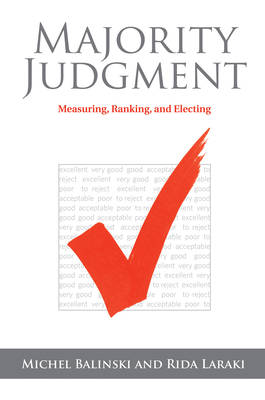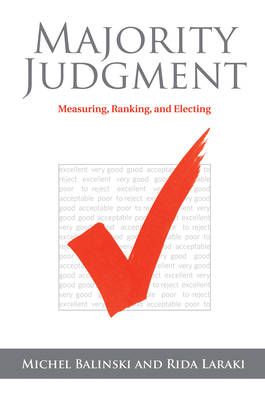
En raison d'une grêve chez bpost, votre commande pourrait être retardée. Vous avez besoin d’un livre rapidement ? Nos magasins vous accueillent à bras ouverts !
- Retrait gratuit dans votre magasin Club
- 7.000.000 titres dans notre catalogue
- Payer en toute sécurité
- Toujours un magasin près de chez vous
En raison de la grêve chez bpost, votre commande pourrait être retardée. Vous avez besoin d’un livre rapidement ? Nos magasins vous accueillent à bras ouverts !
- Retrait gratuit dans votre magasin Club
- 7.000.0000 titres dans notre catalogue
- Payer en toute sécurité
- Toujours un magasin près de chez vous
Majority Judgment
Measuring, Ranking, and Electing
Michel Balinski, Rida Laraki
Livre broché | Anglais
84,95 €
+ 169 points
Format
Description
An account of a new theory and method of voting, judging and ranking, majority judgment, shown to be superior to all other known methods. In Majority Judgment, Michel Balinski and Rida Laraki argue that the traditional theory of social choice offers no acceptable solution to the problems of how to elect, to judge, or to rank. They find that the traditional model--transforming the "preference lists" of individuals into a "preference list" of society--is fundamentally flawed in both theory and practice. Balinski and Laraki propose a more realistic model. It leads to an entirely new theory and method--majority judgment--proven superior to all known methods. It is at once meaningful, resists strategic manipulation, elicits honesty, and is not subject to the classical paradoxes encountered in practice, notably Condorcet's and Arrow's. They offer theoretical, practical, and experimental evidence--from national elections to figure skating competitions--to support their arguments. Drawing on insights from wine, sports, music, and other competitions, Balinski and Laraki argue that the question should not be how to transform many individual rankings into a single collective ranking, but rather, after defining a common language of grades to measure merit, how to transform the many individual evaluations of each competitor into a single collective evaluation of all competitors. The crux of the matter is a new model in which the traditional paradigm--to compare--is replaced by a new paradigm--to evaluate.
Spécifications
Parties prenantes
- Auteur(s) :
- Editeur:
Contenu
- Nombre de pages :
- 432
- Langue:
- Anglais
Caractéristiques
- EAN:
- 9780262545716
- Date de parution :
- 07-06-22
- Format:
- Livre broché
- Format numérique:
- Trade paperback (VS)
- Dimensions :
- 152 mm x 229 mm
- Poids :
- 576 g

Les avis
Nous publions uniquement les avis qui respectent les conditions requises. Consultez nos conditions pour les avis.






